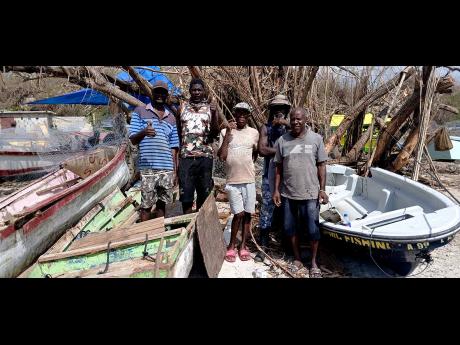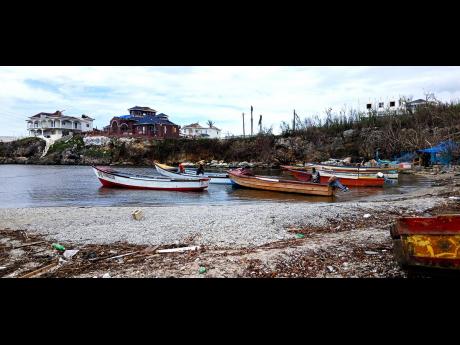‘Like a fish out of water’
Fisherfolk’s livelihoods swept away in Border
On the St Elizabeth side of the border with Westmoreland, there once was an idyllic little fishing village. The village remains but, since Hurricane Melissa tore through, it is almost unsightly, and was littered with damaged boats and debris when The Gleaner visited Border on Tuesday.
The trees on the headlands framing the cove where the village nestles were stripped bare, exposing the rocky ground to which they cling. To the right, roofs of once-majestic houses were partially shredded. Vessels moored to the land bounced gently on the calm waters.
On the beach to the left, a fallen tree cut into several pieces signalled that clean-up was under way. Nearby, a man swept and raked, but he refused to talk. His mind was on his house, blown into oblivion. He grumbled as he walked away. Others repaired and built new fishpots, while some simply sat and chatted.
A few vessels remained intact where Melissa had tossed them. Others were broken in many places, some damaged beyond repair. The buildings where fishermen store their gear were still standing but metal doors had been flung open or torn off by the Category 5 winds. Fallen trees lay tangled in the mess.
Across from the beach, vendors at the popular food stop – known for seafood, bammy, yam, festival, and more – were on the road to recovery. Business was brisk when The Gleaner was on the spot.
Then, one by one, fishermen approached, recounting the horror in their homes when Melissa struck and the woes they now endure. They did not expect her to travel with such force. Believing their boats secure, they tied them up and went home, confident they would return the next day to find them safe.
At home, their thoughts shifted from boats to families as Melissa raged and sent them into turmoil. One man recalled using a piece of plyboard to ward off the winds. With a machete in his right hand, he described Melissa’s impact. “It burst the ply in two, and the wind come in and lick the glass window right out the varandah,” he said.
His house is now damaged, and he lost much – “but not like some people”, he added. At daybreak, he saw the sea level had risen. One boat was missing, another severely damaged, and one seemed intact.
As Kenneth Levy stepped into the camera frame, he said, “Bway, it nuh easy, it terrible … nine a wi sleep in the bathroom, enuh, jus the bathroom save nine of us, the bathroom save nine of us … . It was rough trying to be positive, to encourage the others, yuh could see de panic in dem … . Mi jus decide a saving a life, life … .”
Jonathan Levy followed: “It was about life and death … . Mi mind scatter, all over the place, cannot move, scared, cyaan do nothing … helping others to stay alive for the next day.”
And, when the next day came? “Wi neva si nutt’n like dis, disaster, from wi born we neva see nuttn like dis. Any way yuh guh right now, dem can tell yuh, in the west … . Outta all a dem, this one is the worst, ever,” Levy said.
Yet, all they did to protect their fishpots from Hurricane Melissa was to tie them up. Now, they say, they lost fishpots at sea, and the ones on land were “grine up”. “Wi lose everything!” they said in unison. “All a wi livelihood gone.”
An elder called Onnie said he had only his life left, but felt like a fish out of water – suffocating, waiting for assistance.
Apart from Food For The Poor, no help had come from Government or Opposition, they told The Gleaner. With different levels of need, they estimate three months to recover, depending on one another. Yet nobody has much to share, as “the whole place mash up, every wheh mash up”.
For the fisheries sector, several of the most affected parishes have suffered infrastructural damage, estimated at $2.74 billion. The aquaculture sector suffered about $36 million in losses, affecting at least 41 per cent of fish farmers, Floyd Green Minister of Agriculture and Fisheries disclosed on Tuesday.
Approximately 3,289 vessels were damaged, 45 per cent of the national fleet, with losses estimated at $2.98 billion.
The total impact on the fisheries sector is $5.76 billion.




